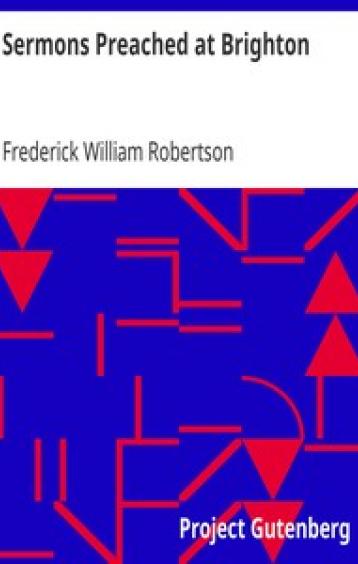Sermons Preached at Brighton Third Series

Sermons Preached at Brighton Third Series
Log in to download this book.
| Publisher | The Project Gutenberg EBook |
|---|---|
| Accessible book producer | Public domain |
| Published year | 2005 |
| Coppy right | Public Domain |
SERMON I. Preached April 28, 1850. THE TONGUE.
St. James iii. 5, 6.—“Even so the tongue is a little member, and boasteth great things. Behold, how great a matter a little fire kindleth! And the tongue is a fire, a world of iniquity: so is the tongue among our members, that it defileth the whole body, and setteth on fire the course of nature; and it is set on fire of hell.”
SERMON II. Preached May 5, 1850. THE VICTORY OF FAITH.
1 John v. 4, 5.—“For whatsoever is born of God overcometh the world: and this is the victory that overcometh the world, even our faith. Who is he that overcometh the world, but he that believeth that Jesus is the Son of God?” 15
SERMON III. Preached Whitsunday, May 19, 1850. THE DISPENSATION OF THE SPIRIT.
1 Corinthians xii. 4.—“Now there are diversities of gifts, but the same Spirit.” 29
SERMON IV. Preached May 26, 1850. THE TRINITY.
1 Thess. v. 23.—“And the very God of peace sanctify you wholly; and I pray God your whole spirit and soul and body be preserved blameless unto the coming of our Lord Jesus Christ.” 43
SERMON V. Preached June 2, 1850. ABSOLUTION.
Luke v. 21.—“And the Scribes and the Pharisees began to reason saying, Who is this which speaketh blasphemies? Who can forgive sins, but God alone?” 61
SERMON VI. Preached June 9, 1850. THE ILLUSIVENESS OF LIFE.
Hebrews xi. 8-10.—“By faith Abraham, when he was called to go out into a place which he should after receive for an inheritance, obeyed; and he went out, not knowing whither he went. By faith he sojourned in the land of promise, as in a strange country, dwelling in tabernacles with Isaac and Jacob, the heirs with him of the same promise: for he looked for a city which hath foundations, whose builder and maker is God.” 77
SERMON VII. Preached June 23, 1850. THE SACRIFICE OF CHRIST.
2 Cor. v. 14, 15.—“For the love of Christ constraineth us; because we thus judge, that if one died for all, then were all dead: and that he died for all, that they which live should not henceforth live unto themselves, but unto him which died for them, and rose again.” 90
SERMON VIII. Preached June 30, 1850. THE POWER OF SORROW.
2 Cor. vii. 9, 10.—“Now I rejoice, not that ye were made sorry, but that ye sorrowed to repentance: for ye were made sorry after a godly manner, that ye might receive damage by us in nothing. For godly sorrow worketh repentance to salvation not to be repented of: but the sorrow of the world worketh death.” 104
SERMON IX. Preached August 4, 1850. SENSUAL AND SPIRITUAL EXCITEMENT.
Ephesians v. 17, 18.—“Wherefore be ye not unwise, but understanding what the will of the Lord is. And be not drunk with wine, wherein is excess; but be filled with the Spirit.” 112
SERMON X. Preached August 11, 1850. PURITY.
Titus i. 15.—“Unto the pure all things are pure: but unto them that are defiled and unbelieving is nothing pure; but even their mind and conscience is defiled.” 122
SERMON XI. Preached February 9, 1851. UNITY AND PEACE.
Col. iii. 15.—“And let the peace of God rule in your hearts, to the which also ye are called in one body; and be ye thankful.” 130
SERMON XII. Preached January 4, 1852. THE CHRISTIAN AIM AND MOTIVE.
Matt. v. 48.—“Be ye therefore perfect, even as your Father which is in heaven is perfect.” 143
SERMON XIII. Preached January 4, 1852. CHRISTIAN CASUISTRY.
1 Cor. vii. 18-24.—“Is any man called being circumcised? let him not become uncircumcised. Is any called in uncircumcision? let him not be circumcised. Circumcision is nothing, and uncircumcision is nothing, but the keeping of the commandments of God. Let every man abide in the same calling wherein he was called. Art thou called being a servant? care not for it: but if thou mayest be made free use it rather. For he that is called in the Lord, being a servant, is the Lord's freeman; likewise also he that is called being free, is Christ's servant. Ye are bought with a price; be not ye the servants of men. Brethren, let every man wherein he is called therein abide with God.” 156
SERMON XIV. Preached January 11, 1852. MARRIAGE AND CELIBACY.
1 Cor. vii. 29-31.—“But this I say, brethren, the time is short: it remaineth that both they that have wives be as though they had none; and they that weep as though they wept not; and they that rejoice as though they rejoiced not; and they that buy, as though they possessed not; and they that use this world as not abusing it: for the fashion of this world passeth away.” 169
SERMON XV. Preached January 11, 1852. THE CHRISTIAN CHURCH A FAMILY.
Eph. iii. 14, 15.—“Our Lord Jesus Christ, of whom the whole family in Heaven and earth is named.” 181
SERMON XVI. Preached January 25, 1852. THE LAW OF CHRISTIAN CONSCIENCE.
1 Cor. viii. 7-13.—“Howbeit there is not in every man that knowledge: for some, with conscience of the idol, unto this hour, eat it as a thing offered unto an idol; and their conscience being weak is defiled. But meat commendeth us not to God: for neither if we eat are we the better; neither if we eat not are we the worse. But take heed lest by any means this liberty of yours become a stumbling-block to them that are weak. For if any man see thee which hast knowledge, sit at meat in the idol's temple, shall not the conscience of him which is weak be emboldened to eat those things which are offered to idols; and through thy knowledge shall the weak brother perish for whom Christ died? But when ye sin so against the brethren and wound their weak conscience ye sin against Christ. Wherefore if meat make my brother to offend I will eat no flesh while the world standeth, lest I make my brother to offend.” 196
SERMON XVII. Preached May 16, 1852. VICTORY OVER DEATH.
1 Cor. xv. 56, 57.—“The sting of death is sin, and the strength of sin is the law. But thanks be to God which giveth us the victory through our Lord Jesus Christ.” 212
SERMON XVIII. Preached June 20, 1852. MAN'S GREATNESS AND GOD'S GREATNESS.
Isaiah lvii. 15.—“For thus saith the High and Lofty One that inhabiteth Eternity, whose Name is Holy. I dwell in the high and holy place—with him also that is of a contrite and humble spirit.” 230
SERMON XIX. Preached June 27, 1852. THE LAWFUL AND UNLAWFUL USE OF LAW. (A FRAGMENT.)
1 Tim. i. 8.—“But we know that the law is good, if a man use it lawfully.” 246
SERMON XX. Preached February 21, 1853. THE PRODIGAL AND HIS BROTHER.
Luke xv. 31, 32.—“And he said unto him, Son, thou art ever with me, and all that I have is thine. It was meet that we should make merry, and be glad: for this thy brother was dead, and is alive again; was lost, and is found.” 253
SERMON XXI. Preached May 15, 1853. JOHN'S REBUKE OF HEROD.
Luke iii. 19, 20.—“But Herod the tetrarch, being reproved by him for Herodias, his brother Philip's wife, and for all the evils which Herod had done, added yet this above all, that he shut up John in prison.” 270




